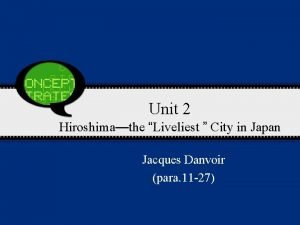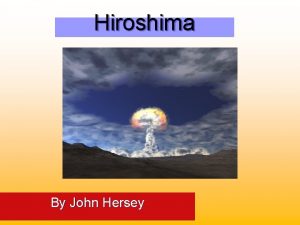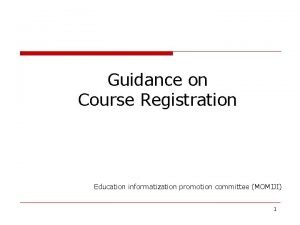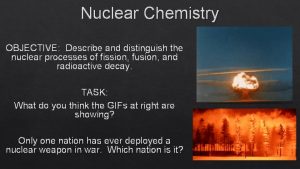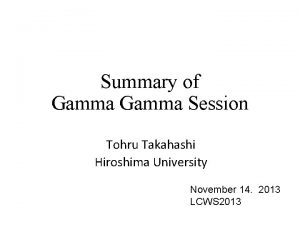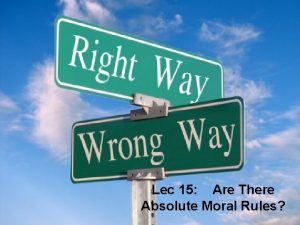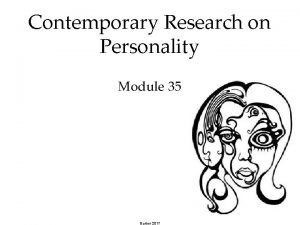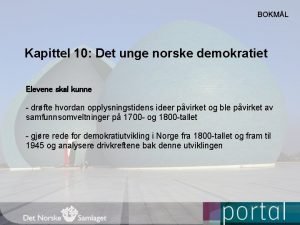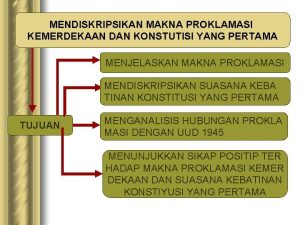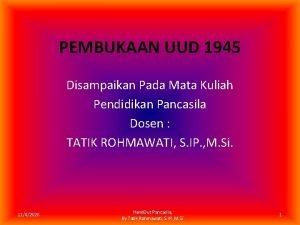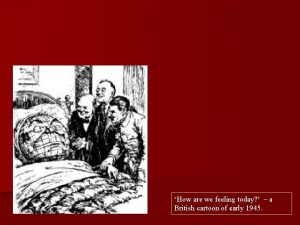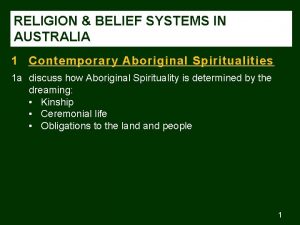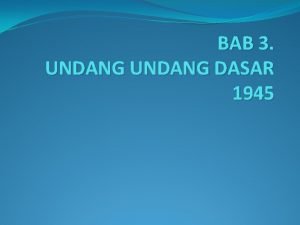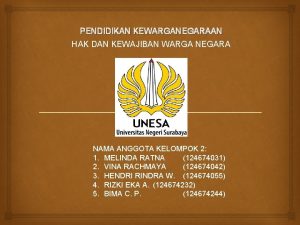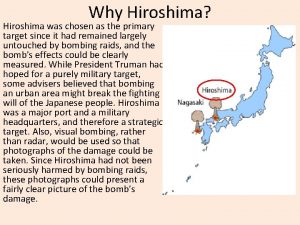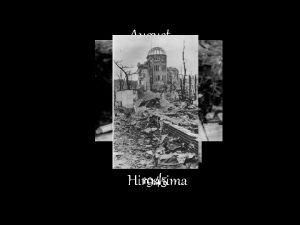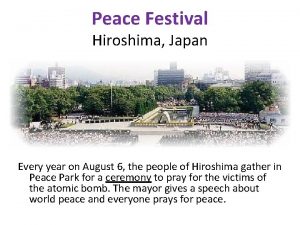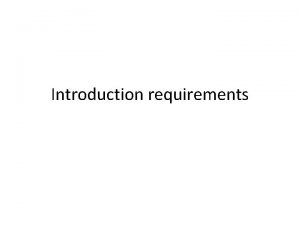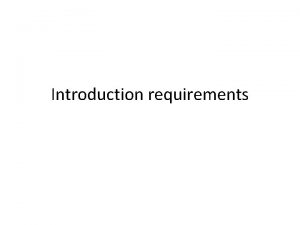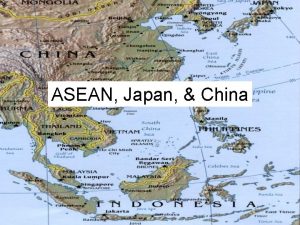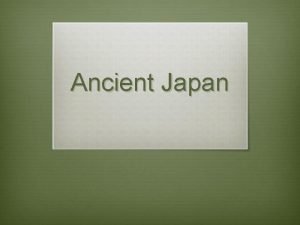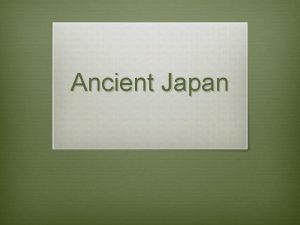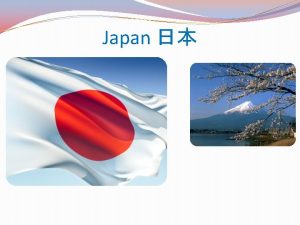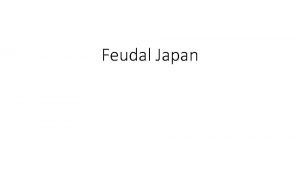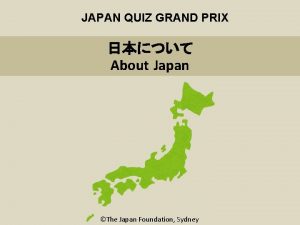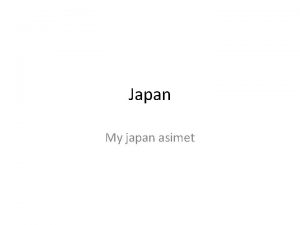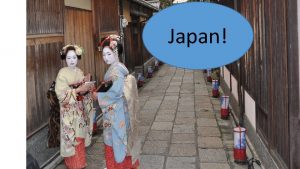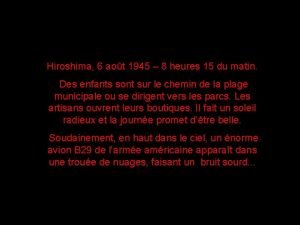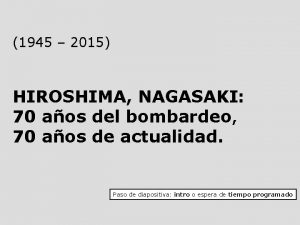HIROSHIMA JAPAN August 1945 During the final stages





























































- Slides: 61

HIROSHIMA - JAPAN August 1945


During the final stages of World War II in 1945, the United States conducted two atomic bombings against the cities of Hiroshima and Nagasaki in Japan. These two events are the only use of nuclear weapons in war to date. Following a firebombing campaign that destroyed many Japanese cities, the Allies prepared for a costly invasion of Japan. The war in Europe ended when Nazi Germany signed its instrument of surrender on 8 May, but the Pacific War continued. Together with the United Kingdom and the Republic of China, the United States called for a surrender of Japan in the Potsdam Declaration on 26 July 1945, threatening Japan with "prompt and utter destruction". The Japanese government ignored this ultimatum, and the United States deployed two nuclear weapons developed by the Manhattan Project. American soldiers dropped Little Boy on the city of Hiroshima on 6 August 1945, followed by Fat Man over Nagasaki on 9 August.

Within the first two to four months of the bombings, the acute effects killed 90, 000– 166, 000 people in Hiroshima and 60, 000– 80, 000 in Nagasaki On 15 August, six days after the bombing of Nagasaki, Japan announced its surrender to the Allies, signing the Instrument of Surrender on 2 September, officially ending World War II. The bombings led, in part, to post-war Japan's adopting Three Non. Nuclear Principles, forbidding the nation from nuclear armament.

Hiroshima explosion, recorded at 8: 15 am, August 6, 1945, is seen on the remains of a wristwatch found in the ruins in this 1945 United Nations photo. • The










U. S. President Harry Truman, left, back from the Potsdam conference, is shown at his White House desk with Secretary of War Henry L. Stimson in Washington, D. C. , Aug. 8, 1945. They discuss the atomic bomb that was dropped on Hiroshima, Japan.




Nagasaki Type Bomb: This is the type of atomic bomb exploded over Nagasaki, Japan, in World War II, the Atomic Energy Commission and Defense Department said in releasing this photo in Washington, December 6, 1960. The weapon, known as the "Fat Man" type, is 60 inches in diameter and 128 inches long. The second nuclear weapon to be detonated, it weighed about 10, 000 pounds and had a yield equivalent to approximately 20, 000 tons of high explosive.


A massive column of billowing smoke, thousands of feet high, mushrooms over the city of Nagasaki, Japan, after an atomic bomb was dropped by the United States on Aug. 9, 1945. A B-29 plane delivered the blast killing approximately 70, 000 people, with thousands dying later of radiation effects. The attack came three days after the U. S. dropped the world's first atomic bomb on the Japanese city of Hiroshima.































This young man, a victim of the second atomic bomb ever used in warfare, is seen as he is lying sick on a mat, in Nagasaki, in late 1945. The bombing killed more than 70, 000 people instantly, with ten thousands dying later from effects of the radioactive fallout.

Maj. Thomas Ferebee, left, of Mocksville, N. C. , and Capt. Kermit Beahan, right, of Houston, Texas, talk at a hotel in Washington, D. C. , on Feb. 6, 1946. Ferebee dropped the atomic bomb over Hiroshima, and Beahan dropped the bomb over Nagasaki.






Commanding officer and pilot Col. Paul W. Tibbets Jr. waves from the cockpit of his bomber plane at its base in Tinian, on August 6, 1945, shortly before take-off to drop the first atomic bomb over Hiroshima, Japan. The day before Tibbets named the B 29 Superfortress after his mother "Enola Gay. "

General Douglas Mac. Arthur signs as Supreme Allied Commander during formal surrender ceremonies on the USS MISSOURI in Tokyo Bay. Behind General Mac. Arthur are Lieutenant General Jonathan Wainwright and Lieutenant General A. E. Percival. 2. September 1945

ENDE ALLE RECHTE AN DIESER PRÄSENTATION, INSBESONDERE AUF BEARBEITUNG UND UMGESTALTUNG LIEGEN BEIM AUTOR… K & H - PPS Gesamtproduktion: Karin und Herbert Hy. Fotos: AP/United Nations, AP Music: : Wishful Thinking Hiroshima
 Hiroshima the liveliest city in japan
Hiroshima the liveliest city in japan Micron memory japan
Micron memory japan Human academy japanese language school review
Human academy japanese language school review Hiroshima
Hiroshima My momiji hiroshima university
My momiji hiroshima university Nagasaki shadows
Nagasaki shadows Tohru hiroshima
Tohru hiroshima Hiroshima
Hiroshima Hiroshima
Hiroshima Japan during the age of exploration
Japan during the age of exploration Alicia has started a new and very different job
Alicia has started a new and very different job Cong thức tính động năng
Cong thức tính động năng Thế nào là mạng điện lắp đặt kiểu nổi
Thế nào là mạng điện lắp đặt kiểu nổi Các loại đột biến cấu trúc nhiễm sắc thể
Các loại đột biến cấu trúc nhiễm sắc thể Lời thề hippocrates
Lời thề hippocrates Bổ thể
Bổ thể Vẽ hình chiếu đứng bằng cạnh của vật thể
Vẽ hình chiếu đứng bằng cạnh của vật thể Phản ứng thế ankan
Phản ứng thế ankan Các môn thể thao bắt đầu bằng từ đua
Các môn thể thao bắt đầu bằng từ đua Sự nuôi và dạy con của hổ
Sự nuôi và dạy con của hổ điện thế nghỉ
điện thế nghỉ Một số thể thơ truyền thống
Một số thể thơ truyền thống Biện pháp chống mỏi cơ
Biện pháp chống mỏi cơ Trời xanh đây là của chúng ta thể thơ
Trời xanh đây là của chúng ta thể thơ Chó sói
Chó sói Bảng số nguyên tố
Bảng số nguyên tố Thiếu nhi thế giới liên hoan
Thiếu nhi thế giới liên hoan Tỉ lệ cơ thể trẻ em
Tỉ lệ cơ thể trẻ em Tia chieu sa te
Tia chieu sa te Các châu lục và đại dương trên thế giới
Các châu lục và đại dương trên thế giới Thế nào là hệ số cao nhất
Thế nào là hệ số cao nhất Hệ hô hấp
Hệ hô hấp Tư thế ngồi viết
Tư thế ngồi viết Hình ảnh bộ gõ cơ thể búng tay
Hình ảnh bộ gõ cơ thể búng tay đặc điểm cơ thể của người tối cổ
đặc điểm cơ thể của người tối cổ Cách giải mật thư tọa độ
Cách giải mật thư tọa độ Tư thế worm breton
Tư thế worm breton Tư thế ngồi viết
Tư thế ngồi viết ưu thế lai là gì
ưu thế lai là gì Thẻ vin
Thẻ vin Thơ thất ngôn tứ tuyệt đường luật
Thơ thất ngôn tứ tuyệt đường luật Cái miệng nó xinh thế chỉ nói điều hay thôi
Cái miệng nó xinh thế chỉ nói điều hay thôi Các châu lục và đại dương trên thế giới
Các châu lục và đại dương trên thế giới Từ ngữ thể hiện lòng nhân hậu
Từ ngữ thể hiện lòng nhân hậu Diễn thế sinh thái là
Diễn thế sinh thái là Thế nào là giọng cùng tên?
Thế nào là giọng cùng tên? Phép trừ bù
Phép trừ bù Hát lên người ơi alleluia
Hát lên người ơi alleluia Khi nào hổ con có thể sống độc lập
Khi nào hổ con có thể sống độc lập đại từ thay thế
đại từ thay thế Quá trình desamine hóa có thể tạo ra
Quá trình desamine hóa có thể tạo ra Vẽ hình chiếu vuông góc của vật thể sau
Vẽ hình chiếu vuông góc của vật thể sau Eesti laulja
Eesti laulja Demokratiutvikling i norge fra 1800-tallet og fram til 1945
Demokratiutvikling i norge fra 1800-tallet og fram til 1945 Sidang pertama ppki 18 agustus 1945
Sidang pertama ppki 18 agustus 1945 Premis mayor pembukaan uud 1945 terletak di
Premis mayor pembukaan uud 1945 terletak di How we feeling today
How we feeling today Fc united of manchester wiki
Fc united of manchester wiki Secularism in australia post 1945
Secularism in australia post 1945 4 pokok pikiran pembukaan uud 1945
4 pokok pikiran pembukaan uud 1945 Pengertian kewarganegaraan
Pengertian kewarganegaraan
